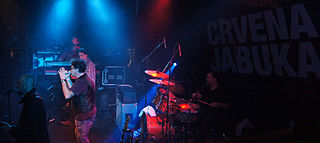
Zdravko Čolić is a pop singer from Bosnia and Herzegovina and is widely considered one of the greatest vocalists and cultural icons of the former Yugoslavia. Dubbed the 'Tom Jones' of the Balkans He has garnered fame in Southeastern Europe for his emotionally expressive tenor voice, fluent stage presence and numerous critically and commercially acclaimed albums and singles.

Željko Joksimović is a Serbian vocalist, composer, songwriter, multi-instrumentalist and producer. He plays 12 different musical instruments including accordion, piano, guitar and drums. Joksimović is multi-lingual, being fluent in Greek, English, Russian, Polish and French as well as his native Serbian.

Milojko "Mile" Kitić is a Bosnian-born Serbian folk singer. He rose to prominence as a member of the popular eighties folk collective Južni Vetar with fellow folk singers Sinan Sakić, Dragana Mirković, Kemal Malovčić and Šemsa Suljaković. One of his first hits was song "Mala, mala iz Novog Pazara".

Anthony Cetinski, known professionally as Tony Cetinski, is a Croatian pop singer. Today, he is one of the most popular male singers in Croatia and countries of former Yugoslavia.

Oliver Dragojević was a Croatian recording artist and music composer, who was considered one of the most enduring musical stars and cultural icons in Croatia with a discography that spanned nearly five decades. His style blended traditional klapa melodies of Dalmatia, a coastal region in his native Croatia, with jazz motifs wrapped up in a modern production.

Crvena jabuka is a Bosnian rock/pop band that originated in 1985, and since then has remained very popular.

Šta bi dao da si na mom mjestu is the second studio album from influential Yugoslav rock band Bijelo Dugme, released in 1975.
Selma Bajrami is a Bosnian pop-folk singer. Her professional music career began when she was a teenager with the release of her first studio album Kad suza ne bude... in 1998.

Šemsa Suljaković is a Bosnian folk singer.
Miloš Bojanić is a Bosnian pop-folk singer, well known in former Yugoslavia where he has maintained a popularity throughout his 30-year-career.

Neda Ukraden is a Serbian singer. Her professional career stretches back to 1967.

Aman, Aman is the fourth studio album of Montenegrin singer Šako Polumenta, which was released in 1999.
Funky G are a Serbian dance duo.
Suzana Jovanović is a Serbian pop-folk singer. Jovanović started singing in 1994 when she released her first album Poslaću ti ljubav for Juvekomerc.
"We Love You, Our Fatherland" is a 1997 Serbian patriotic song written by Stanoje Jovanovic (lyrics) and Rade Radivojević (composer). The song was popular in Serbia during the 1999 NATO bombing of Yugoslavia.

Nenad "Neno" Belan is a Croatian rock musician known as the frontman of Đavoli, as well as for his solo work.

Predrag Gojković Cune was a Serbian vocalist and recording artist with a career spanning six decades.

Zlatni Prsti were a Yugoslav rock band formed in Zaječar in 1970.
Zorica Brunclik is a Serbian singer of folk music; both traditional and newly composed. Arguably one of the most famous ex-Yugoslavian artists, Zorica Brunclik is known for her singing voice, fashion style and bright pink hair.

Zorica Kondža is a Croatian pop-rock singer. She is best known for her soprano vocal range, which she displayed as the lead vocalist for the 1980s pop-rock music act Stijene. Since 1981, she had participated in most of the Split Festivals until 2014, which she had won 7 times. Other than the Split festivals, she also took part in various other jamborees in Croatia, such as the Zadarfest, Dora and Mesam. She began her solo career in 1984, which gained her success in Croatia and neighbouring countries.














